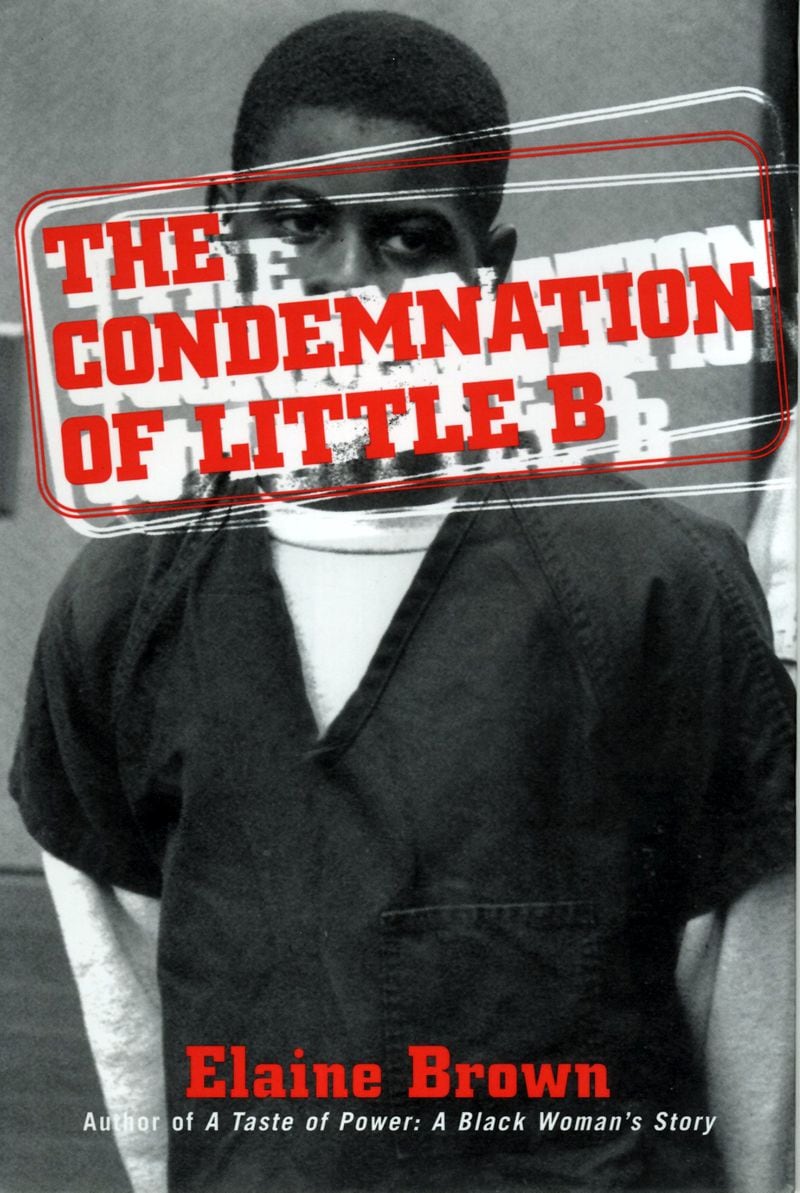Originally published March 3, 2002
Elaine Brown calls it being “on the righteous trail,” and she rides it with a vengeance.
With the same combustible passion that propelled her to the top ranks of the Black Panthers nearly 30 years ago, Brown – who lives now in Atlanta – has found another cause. In a book titled “The Condemnation of Little B” (Beacon Press, $24), she contends that 13-year-old Michael Lewis, aka Little B, was not guilty of the 1997 murder that earned him a life sentence.
But beyond that, Brown believes that even if he were guilty, he’s not to blame.
Save the knee-jerk declarations of “doing the crime, doing the time.” Let’s just listen for a minute.
“There was so much publicity around this case,” Brown says. “And it wasn’t just that it was publicity. This boy was being castigated in a way that was incredible. It was almost mythic! He was an evil in the town. . . .”
Credit: see caption
Credit: see caption
Lewis was arrested after Darrell Woods, a 23-year-old father, was shot to death in front of his two young sons while sitting in a parked car outside a convenience store. It was a major story in this newspaper, on local TV newscasts and elsewhere. Woods was Black and Lewis is Black, but Brown fears an insidious racism in a society willing to write off its troubled Black youth as simply evil while searching for causes of equally horrific crimes by white kids.
About a month before Lewis stood trial for murder, 16-year-old Luke Woodham stabbed his mother to death and then went to his high school in Pearl, Miss., where he fatally shot two fellow students and wounded seven others.
“Woodham’s case was only the first in a series of . . . multiple murders that would grip the nation over the next few years,” Brown writes. “All of the perpetrators, all of them white teenage boys, would be defined in the press as possessed, misunderstood, isolated or lonely – but never ‘evil.’ "
In the news coverage of Lewis’ trial, Woods repeatedly was cast as a devoted family man – “the kind of man who was a rare source of Black pride,” Brown writes – and Lewis became the embodiment of all that was wrong in the African-American community. The son of an absent father and a crack-addicted mother, Lewis had been a ward of the state since he was 11. He had lived pretty much on the streets for the two years before his arrest.
“Nobody was there for him,” Brown says. “There was no system in place, no institution in place. So I thought at the time, ‘Now if he killed somebody, why is anybody surprised?’ You throw him in the sewer and now you want him to act like he’s been nurtured and cared for all of his life?”
Brown’s methods and her manner have changed over the years. Now 59, she appears more professorial than radical. And in her new incarnation as a muckraker, she is distinctly maternal.
“Yeah, I’ve become a mother figure for him,” she says of Lewis. “But that’s what we do when we get older. That’s what we’re supposed to be doing.”
In her 1992 memoir, “A Taste of Power,” Brown gave an unflinching account of her impoverished childhood in North Philadelphia, her long and troubled love affair with charismatic Black Panther Party leader Huey P. Newton, and her assumption of power when he fled to Cuba in 1974.
In 1977, increasingly unable to reconcile herself with the Panthers’ sexist foundation, she took her 7-year-old daughter, Ericka, and left the party. Ultimately, she landed in Paris, where she lived for seven years. In 1993, she moved to Atlanta, where her daughter had graduated from Spelman College and was working in CNN’s library. (Now married, Ericka Brown Abram works at the Tubman African American Museum in Macon.)
Brown’s goal is simply stated: She wants to win a new trial for Lewis.
Now 18, Lewis spent the first five years of his sentence at Arrendale State Prison in northeast Georgia, which houses young criminals convicted as adults. In December, he was transferred to Phillips State Prison, a close-security adult facility in Buford.
In prison paperwork, counselors describe Lewis as difficult and disruptive. He has twice been recommended for special education and has refused. He also refuses to work in prison, for which Brown takes full credit or blame, depending on your point of view.
“They don’t pay inmates a dime to work,” she says. “I told him to tell the guards his mama said he couldn’t work.”
Lewis calls Brown every day, and she visits him every weekend that her traveling schedule permits.
“I say to Michael, ‘You are going to walk out of prison. And you are going to walk out whole. I give you my word on that. None of these people scare me.’ That’s the way you have to be sometimes. Somebody has to stand up. And I’m tough enough.”
In “The Condemnation of Little B,” Brown is tough on almost everybody.
“What was most startling about this steady demonization of Little B . . . was the silence of Blacks themselves, especially the local Black leadership,” Brown writes. “Not a single voice was lifted from the pulpit or the podium to challenge the premise or the implications of the wild assertions being made about this Black boy, not to mention the pretrial presumption of his guilt contained therein. This silence suggested that Blacks who had slipped into the mainstream of society were drinking from the tributary of racism that still flowed there.”
There is almost a biblical tone of indignation throughout the book.
Brown saddles the news media – and specifically The Atlanta Journal-Constitution in the case of Little B – with responsibility for creating the modern myth of the superpredator. And she singles out former President Bill Clinton for fostering what she terms “New Age Racism.”
“We have shifted responsibility onto Blacks by saying, ‘Well, if Blacks are poor, there must be something wrong with them,’ " Brown says. " ‘If they’re going to prison in these large numbers, it’s because they’re committing crimes. There’s no more racism in America; they just can’t make it.’
“But Little B was an example of what happens,” she adds, “when the whole country just shrugs off any kind of social commitment to a group of people who have been long oppressed.”
There are some interesting points in this book that will set off all kinds of knee-jerking in this city. And in many instances, the attacks are personal.
“Looking beyond advancing his own career interests as the state’s first Black district attorney,” Brown writes, “[District Attorney Paul] Howard also understood his role in serving the big economic interests of Atlanta. He had become an obsequious Jonah, comfortable in the belly of the whale.”
Whether you agree with her views of justice in the case of Michael Lewis or her analysis of racism in the larger society, Brown is a compelling figure in the city’s mix. This woman who in her 30s led a paramilitary organization (her description) now stops to help an obviously befuddled elderly woman who has forgotten where she parked her car.
And yet she refuses to be civil to Howard, once declining to shake his hand in a public forum.
Her unrelenting forthrightness can be startling, and it can be utterly disarming.
“I’m Holden Caufield . . .,” she says. “I just want to be the catcher in the rye, and I get angry when people are pushing these kids off the cliff. That’s just who I am. . . . It’s not that I’m an especially good person. I just identify with being someone who nobody cares about.
“And there’s a certain commitment I think we ought to have to each other. It goes beyond race and gender and all those other things.”
In an ongoing dialogue that so rarely gets beyond “race and gender and all those other things,” hers is a strong voice.
About the Author






